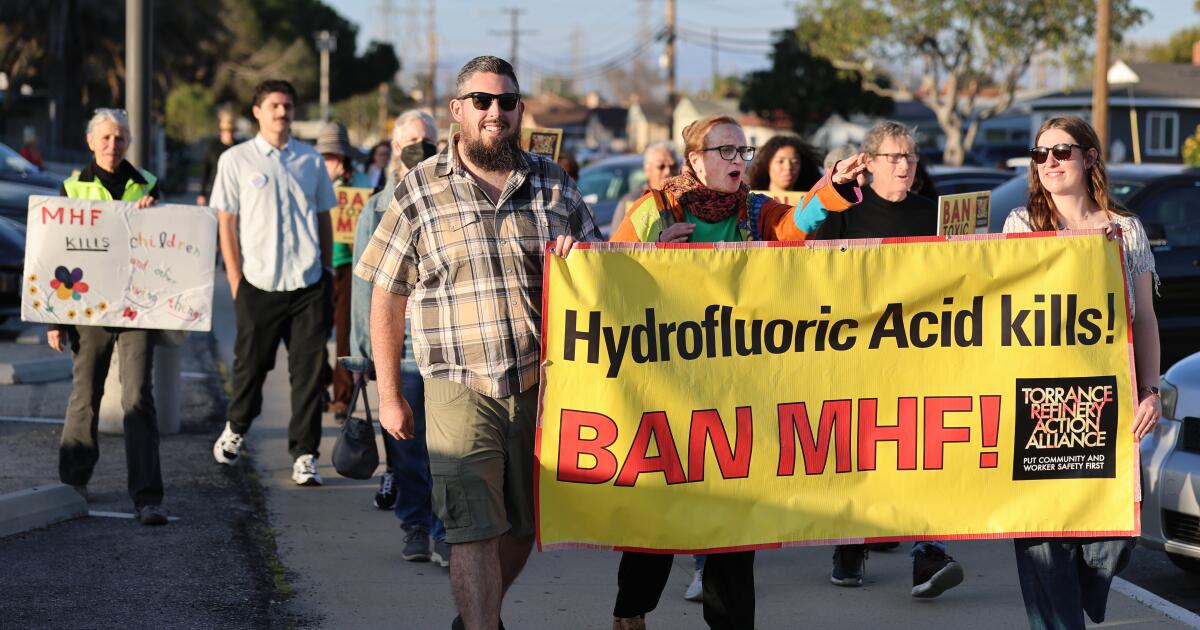New York
Hochul Backs Plan to Ease Evidence Requirements for New York Prosecutors

Six years ago, with crime rates at historic lows and Democratic progressivism on the rise, New York State began requiring prosecutors to turn over reams of evidence to defense lawyers well before a trial.
The goal was to level the playing field for criminal defendants, who often took plea deals without understanding the full scope of the case being built against them.
But many of the state’s district attorneys say that their offices have struggled to comply with the new requirements and blame them in part for an increase in case dismissals, which rose 22 percentage points in New York City.
They have urged state leaders to consider changing the so-called discovery rules, and have won over a powerful ally, Gov. Kathy Hochul.
The governor, a Democrat, is backing a measure that would ease the consequences for prosecutors if they do not share evidence in a timely manner. Her proposal would also let them redact information without a judge’s permission.
Ms. Hochul has said her plan will improve processing times and solve the problem of dismissals “based on technicalities that can prohibit justice to victims and the people of the State of New York.”
Ms. Hochul’s embrace of the issue reflects a broader shift in the priorities of politicians in New York and across the nation. In recent elections, Republicans have made gains by tarring Democrats with accusations that they are soft on crime. New York’s leaders have sensed the shifting winds and grasped for ways to show voters they are taking their public safety concerns seriously. Not only prosecutors but liberal power brokers like the Rev. Al Sharpton back Ms. Hochul’s ideas.
“There is a swing back toward pragmatism on how we approach the criminal justice problem,” said Lee Kindlon, a Democrat and Albany’s district attorney, who was a defense lawyer before taking office in the fall. “The politics have changed.”
Ms. Hochul’s requests, which were included in her executive budget proposal this year, have alarmed defense lawyers. Her efforts would return New York to the days when prosecutors would face no consequences for waiting until the day of trial to share evidence, depriving defendants of the chance to mount an informed defense, they said. Prosecutors, they say, will revert to withholding material.
Eli Northrup, policy director of the criminal defense practice for the Bronx Defenders, disputed prosectors’ arguments, saying that cases “can’t get dismissed on a ‘technicality.’”
“I understand the broader complaint of cases shouldn’t go away,” Mr. Northrup said. “But it’s the responsibility of a government that is bringing charges against somebody to bring documents.”
Changes to the discovery law will be part of broader budget negotiations among the leaders of the State Senate and Assembly, who are both Democrats and have expressed discomfort with some changes. Both chambers recently left the government’s proposals out of their budget counteroffers.
Andrea Stewart-Cousins, the Senate majority leader, said they should discuss the subject later outside budget talks. Carl Heastie, the Assembly speaker, said he was open to changing the law but was concerned about giving prosecutors total discretion.
“We would rather let the judge be the actual arbiter,” Mr. Heastie said.
Broad changes to the criminal justice system were approved in 2019. At the time, New York was one of 10 states that allowed prosecutors to wait until the eve of trial to hand over crucial evidence.
The new discovery law was a major win for defendants, who had helped draft the measure. But prosecutors say they now have to devote hundreds of hours to collecting materials they say are only tangentially related to a case.
Prosecutors have said that judges regularly dismiss cases because of minor mistakes in supplying evidence, a process known by the legal term discovery. The remedy should be proportional and not result in automatic dismissals for violating the Constitution’s speedy trial requirement, they have said.
Only 5 percent of misdemeanor and felony cases in criminal court in New York City were dismissed because of speedy trial violations in 2019, according to state court data. In 2024, that number had jumped to 31 percent.
Prosecutors insist that their goal is not to roll back the 2019 law.
Alvin L. Bragg, the Manhattan district attorney, said that he supports lawmakers making “common-sense adjustments to the statute to protect victims of crime.” The changes would keep the state’s laws “the most open and transparent discovery laws in the nation,” he said.
Darcel Clark, the Bronx district attorney, recently told lawmakers that she “championed the transformation.” Prosecutors, she added, want “minor revisions to help for the things that were the unintended consequences.”
Amanda Jack, policy director at the Legal Aid Society, said that the governor’s support, along with that of New York City’s police commissioner, Jessica Tisch, and mayor, Eric Adams, has given the prosecutors’ mission momentum.
Ms. Hochul said this month that unease about safety changed people’s attitudes about discovery laws “dramatically.”
“I am just trying to solve the problem,” she said, adding that “the pendulum swings, and you start seeing the impact.”

New York
How a Family of 4 Lives on $168,000 in East Elmhurst, Queens

How can people possibly afford to live in one of the most expensive cities on the planet? It’s a question New Yorkers hear a lot, often delivered with a mix of awe, pity and confusion.
We surveyed hundreds of New Yorkers about how they spend, splurge and save. We found that many people — rich, poor or somewhere in between — live life as a series of small calculations that add up to one big question: What makes living in New York worth it?
When Erika Fernandez-Pacheco was a child growing up in New York City, her family lived largely paycheck to paycheck. Her parents, both immigrants, met at a factory in Manhattan. Her father later worked as a taxi driver and a bodega owner.
These days, Ms. Fernandez-Pacheco and her husband, Manuel Pacheco, are far from rich, but they’re more than comfortable.
Ms. Fernandez-Pacheco works as a sports journalist and content creator, and Mr. Pacheco works in food service at a Manhattan hotel. Together, they earn between $165,000 and $170,000 in a typical year. They have two daughters, 4 and 1.
“We’re not just getting by,” Ms. Fernandez-Pacheco said. “We have a life.”
Luck be a landlord
Having a good landlord in New York City is the best kind of luck.
Ms. Fernandez-Pacheco, 37, and Mr. Pacheco, 38, moved to East Elmhurst, in Queens near LaGuardia Airport, during the Covid pandemic. Ms. Fernandez-Pacheco was pregnant, and they were in search of more space and cheaper rent. They found both in a three-family home on a quiet street.
Their 700-square-foot apartment has two bedrooms and lots of closet space. The landlords, who live downstairs, have not raised the couple’s $1,800 monthly rent since 2021, when they moved in.
But their apartment is far from public transit. Mr. Pacheco has to leave for work by 4:15 most mornings, before the bus starts running. So he uses his monthly Lyft membership to take a car to the nearest subway, which is a half-hour walk away. It’s a $10 expense, even before he swipes his transit card.
The couple looked for apartments closer to the subway but found that rents were $2,500 or more for cramped spaces. They decided to stay put, content with their affordable apartment in their affordable neighborhood.
Recently, Ms. Fernandez-Pacheco has been scrolling a Reddit page where New York parents vent about how expensive it is to live here. Sometimes, their complaints make her roll her eyes.
“The amount of people who are like, ‘I can’t afford to live in New York’ — I’m like, duh, you live in Park Slope!” she said. “Move to Queens, move to the Bronx.”
Grandparents make the best babysitters
The couple have never paid for a babysitter, relying instead on both sets of grandparents to help care for their daughters.
It’s a lot to ask of their aging parents, but the nearby day care centers charge about $2,500 a month, more than the family’s rent.
The system isn’t exactly foolproof. Ms. Fernandez-Pacheco works from home part of the week and watches her children when she has breaks.
She’ll never forget the morning when she was logging on for an important Zoom meeting and her older daughter started vomiting. Ms. Fernandez-Pacheco’s parents were still en route to the house, so she had to slam her laptop shut and rush to her daughter.
When her younger child had a bad case of the respiratory infection R.S.V., Ms. Fernandez-Pacheco worked from the hospital.
The family has found real relief in the city’s free prekindergarten program. The couple’s older daughter attended 3-K last year, and after a tough transition to being dropped off at school, she came to love it. She’s in pre-K this year, which has helped relieve the burden on the grandparents, and will attend a local public school come fall.
The family’s medical costs are minimal. Because Mr. Pacheco is a member of the Hotel and Gaming Trades Council, one of the city’s most powerful unions, the entire family has access to free insurance offered at the union’s dedicated health centers.
The couple is selective about which activities they send the girls to. They’ve signed their older daughter up for swim lessons at a local pool, which cost $45 a week. In the winter, when it’s too cold to take the kids to the playground, they visit a bouncy house nearby, which costs $17 for two hours.
‘Not taking this money to the grave’
The family’s ability to relax enough to enjoy their lives requires long-term planning and diligent saving.
The couple aims to put away about $1,200 a month, hoping to someday have enough saved for a down payment on a house. Sometimes, though, they manage only $500 or so.
They are strategic about their grocery shopping.
The couple uses Ms. Fernandez-Pacheco’s father’s wholesale account at Jetro, a wholesale shop for people in the food business, left over from his days as a bodega owner. They shop there twice a year to buy frozen chicken and beef in bulk, typically spending $150 per trip. The family spends another $250 or so on groceries a month, splitting their shopping between Costco, which Ms. Fernandez-Pacheco thinks has the best prices, and BJ’s, which she believes has the better coupons.
“I feel like I’ve turned into my parents,” Ms. Fernandez-Pacheco said. “I ask around about how much a head of lettuce costs” at different stores.
They waited to buy new tires for their car, which is now paid off, so they could save $600 on a new set during a Black Friday sale.
That budgeting allows them to spend on what they really care about.
They threw big parties for each daughter’s first birthday, with more than 100 guests, top-shelf liquor and lots of food, including homemade ceviche from Ms. Fernandez-Pacheco’s parents, sourced from a seafood market in Flushing, Queens. The total cost for their older daughter’s party, including the venue rental, was about $4,500, which the couple thought was worth it to mark a major milestone for their family.
The couple asked their guests to contribute to their daughters’ college savings accounts in lieu of gifts.
And they try to take one big family vacation a year, most recently to Barbados, which cost about $4,000 between flights and hotels.
It has taken some time for Ms. Fernandez-Pacheco to feel comfortable splurging on herself and her family from time to time. When she frets over a decision, she thinks of her mother-in-law’s encouragement to live a little: “You’re not taking this money to the grave.”
We want to hear from you about how you afford life in one of the most expensive cities in the world. We’re looking to speak with people of all income ranges, with all kinds of living situations and professions.
New York
How the Designer Todd Snyder Gets Ready for New York Fashion Week

Some New Yorkers don’t go above 14th Street in Manhattan. Not Todd Snyder.
Mr. Snyder, 58, the American luxury menswear designer, spends his days within a five-block radius immediately north of Madison Square Park.
When he moved to New York City from Iowa in 1992, Mr. Snyder honed his craft by working for Ralph Lauren, Gap, Old Navy and eventually J. Crew, where he helped update the men’s line and designed the popular Ludlow suit.
In 2011, he launched his own line with modernized American classics, crafted from premium Italian and Japanese fabrics.
“For a lot of men, fashion is a four-letter word,” Mr. Snyder said. “My whole goal has been trying to figure out how to simplify fashion for men.”
He recently spent a Sunday with The New York Times as he and his team assembled styles for a lookbook, “American Form,” set to be released during New York Fashion Week.
New York
18 Days, 20 Lives: New Yorkers Who Didn’t Survive the Cold

Tuesday, Jan. 27
Philip Piuma, 47, left his home on Jan. 26 around 1:30 p.m. to pick up a prescription for his uncle at CVS. The next morning, he was found dead on a bench outside a Key Food supermarket a mile away.
Mr. Piuma’s stepfather, John Sandrowsky, said detectives told him that Mr. Piuma had fallen twice, possibly from the bench outside Key Food, broken his nose and injured his eye socket.
At around 6 p.m. on Jan. 26, Mr. Piuma entered the store and lurched unsteadily in the aisles, said a manager, Luis Polanco, who assumed he was drunk. Mr. Piuma bought two jars of peanut butter, went outside and sat on the bench.
At 9 p.m. when Mr. Polanco was closing up, Mr. Piuma was still there. “I asked, ‘Everything OK?’ He said ‘yes,’” Mr. Polanco said.
Security footage shows that sometime after 10 p.m., Mr. Piuma toppled over, sprawling across the bench. When Mr. Polanco arrived around 6 a.m. to open the store, Mr. Piuma did not stir when he greeted him. He called 911.
Mr. Sandrowsky said detectives told him that someone had given his stepson tissues for his bleeding face at some point. “You offered some help, that’s great,” he said. “But if you’re bleeding out there and it’s that cold, I would question whether or not you’re OK.”
Mr. Piuma, who worked two jobs — as a dispatcher for an alarm company and an ambulette service — was a devoted volunteer at a nearby church, Mr. Sandrowsky said. “He had a good heart,” he said.
-

 Alabama1 week ago
Alabama1 week agoGeneva’s Kiera Howell, 16, auditions for ‘American Idol’ season 24
-

 Illinois1 week ago
Illinois1 week ago2026 IHSA Illinois Wrestling State Finals Schedule And Brackets – FloWrestling
-

 Culture1 week ago
Culture1 week agoTry This Quiz on Passionate Lines From Popular Literature
-

 Science1 week ago
Science1 week agoTorrance residents call for the ban of ‘flesh-eating’ chemical used at refinery
-

 Politics1 week ago
Politics1 week agoWest Virginia worked with ICE — 650 arrests later, officials say Minnesota-style ‘chaos’ is a choice
-

 Science1 week ago
Science1 week agoTrumpRx is launched: How it works and what Democrats say about it
-

 Fitness1 week ago
Fitness1 week ago13 best fitness watches for 2026, tried and tested
-

 Health6 days ago
Health6 days agoJames Van Der Beek shared colorectal cancer warning sign months before his death

























